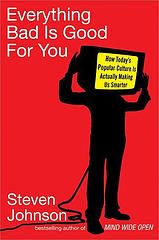 it’s taken me awhile to write the second installment of this critique (part 1 here) because i’ve been wrestling with how to expand the terms of the discussion. i’ve been reading the various reviews and discussions and even listened to the recent MIT symposium on the book. all of the critical energy is spent asking whether the conclusion — that modern electronic media is raising IQ and certain problem-solving skills– is based on thorough or good science; if it’s “true” or not.
it’s taken me awhile to write the second installment of this critique (part 1 here) because i’ve been wrestling with how to expand the terms of the discussion. i’ve been reading the various reviews and discussions and even listened to the recent MIT symposium on the book. all of the critical energy is spent asking whether the conclusion — that modern electronic media is raising IQ and certain problem-solving skills– is based on thorough or good science; if it’s “true” or not.
whether people end up believing that Johnson is 10, 20, 30, 70 or 90 percent right about the effect of media on IQ and problem-solving skills, they mostly accept his boundaries of the subject. i seem to be coming at it from another direction. the problem for me isn’t Johnson’s conclusion which i think is “sorta correct’ but rather that by defining the question of media’s impact so narrowly the overall effect of his argument is to turn people away from much deeper questions about the role of media in shaping how we see the world and how we behave in it.
i believe that the shallowness of the debate around Johnson’s book is an excellent example of ways in which the effect of popular media has indeed been “bad” for us, not good. whether our IQs have gone up or not, the failure of most television and games to deal with moral complexity and the increasing tendency of TV news to entertain rather than inform have had made other more significant changes in our behavior — most significantly we are increasingly unable or resistant to look deeply and all-sidedly into important questions.
more tomorrow.
if:book
A Project of the Institute for the Future of the Book
